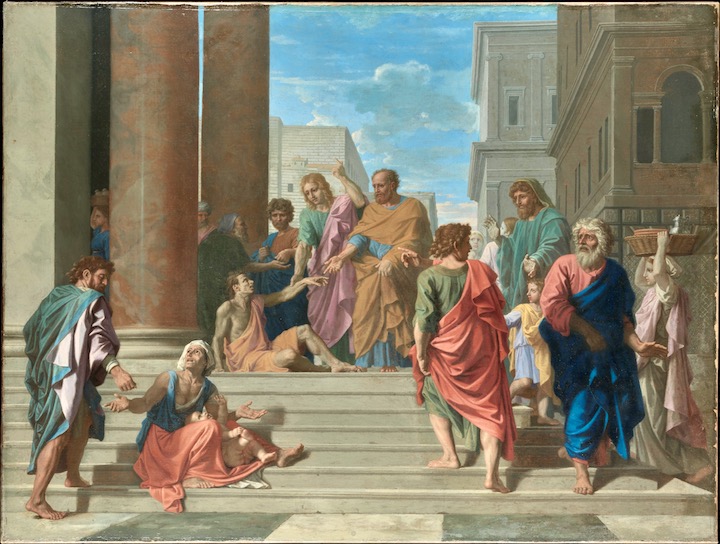Living as we do in a society that is increasingly dominated by a secular humanist worldview, it is not easy for Catholics to hold on to their Catholic worldview. One reason for this is that Catholicism is a religion that abounds in divine revelations, while secularism holds that there is no such thing.
For Catholics there are, to begin with, the major revelations – made through the prophets, through the Bible, and through the Church. And these are followed by a multitude of minor revelations.
These minor revelations are normally made to individuals, offering them guidance in times of trouble or confusion, usually in response to prayer. “Should I marry this woman?” “Should I divorce my husband?” “Should I accept this job and move out of town?” “Should I become a nun?” “Should I drop out of college?” “Should I sell my house?” “Should I undergo chemotherapy?” “Should I disconnect my comatose mother from her life-support systems?” “Should I vote for Donald Trump?” “Should I report my criminal grandson to the police?”
These and a million other practical questions are put to God every day by believers. And God answers – many of those who ask these questions at least believe so. No doubt many of the “answers” received are not really answers coming from God; rather they come from the hopes or fears or wishes of the person asking. But the fact that some people fool themselves doesn’t mean that everybody does.
If God exists, and if he cares for his people, it is quite believable that God will give them guidance in their moments of crisis. How odd it would be if God never gave his friends the guidance they ask for.
Catholics also believe that there are moments, sometimes very brief moments, at other times lengthy moments, when a believer can “sense” or “feel” the presence of God. Of course, these feelings are often erroneous. But there is no reason to believe that they are always erroneous. Just the opposite. There is every reason to believe that if God is omnipresent (as Christianity believes he is), and if he cares for his people, especially those of his people who care for him, that he would from time to time make his presence known to them.
Further, if God once made a great visit to mankind in the person of Jesus Christ, why should he not make millions of lesser visits to his people? Isn’t he the kind of God who pays visits?
The most impressive of these personal visits are those that the mystics claim to have experienced; that is, an experience of intimate union with God. Mysticism has been a relatively common thing in the history of Christianity. It has been rare in Protestantism (though one must remember the early Quakers), but not at all rare in the Catholic and Orthodox forms of Christianity.

Mysticism, moreover, is not confined to Christianity. It has been found in Hinduism, in Buddhism, and in Islam. It was even found in the ancient pagan world. Think, for example of Socrates and his many-hours-long trance described by Alcibiades in Plato’s Symposium.
Catholics believe that God often reveals himself to those who study nature carefully. He reveals himself as a source of beauty to persons who have a strong appreciation for the beauty of nature: to painters, for instance, or to poets. (See Wordsworth’s “Tintern Abbey.”) Or he reveals himself as a creative mathematician to scientists who are astounded by the mathematical order of nature (e.g., Galileo, Newton, Einstein).
In many religions, believers have reported seeing visions of the gods. In Catholicism, of course, believers cannot, strictly speaking, see visions of God since God in his proper self is invisible. But they have seen (or claim to have seen) visions of Jesus and of saints, especially Mary, the mother of Jesus.
They have understood these visions to have been sent by God, and they have regarded the messages that accompany these visions as messages from God. No doubt many of these apparent visions are no more than hallucinations, produced not by God but by the troubled state of the visionary’s mind. But if God exists, what reasons do we have for believing that he never sends visions?
Sometimes these visions have been more or less public. For instance, the Virgin Mary is reported to have appeared at Lourdes, at LaSallette, and at Fatima. (Many people also believe that she has appeared at Medjugorie. But Church authorities, who have ratified the appearances of Lourdes, LaSallette, and Fatima, have tended to be doubtful about Medjugorie.)
Before the Catholic Church canonizes a departed person as a saint, she demands that two actual miracles (that is, marvelous happenings that cannot reasonably be attributed to natural or man-made causes and must, therefore, be attributed to a supernatural cause) be credited to the saint in question.
Usually, these are medical miracles; very surprising cures of an incurable disease. Many prayers have been offered to the saint on behalf of the person in need. When the miracle happens, credit is given to the saint – who, it is supposed, asked God to produce the miracle. (The saint himself, according to Catholic teaching, cannot produce a miracle; only God can do this.)
These miracles are believed to provide evidence for a number of conclusions: (a) that heaven is real; (b) that the saint in question is in heaven; (c) that petitionary prayer, both the prayers of humans and the prayers of saints, is efficacious; (d) that God works miracles; and (e) that an all-powerful God exists.
If you’re an atheist or semi-atheist, you find all this awfully hard to believe. But if you believe in God, why wouldn’t you also believe that, by many and marvelous ways, he stays constantly in touch with his people?
*Image: Saints Peter and John Healing the Lame Man by Nicolas Poussin, 1665 [The Met, New York City]















